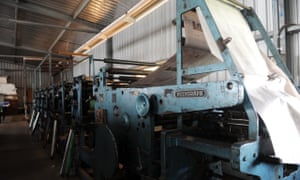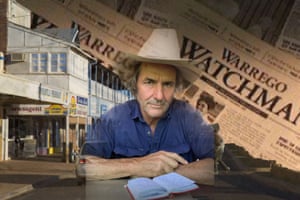Community papers are part of the fabric of many small towns and,
despite widespread closures, some are determined not to stop the presses
“When
you sit down to write the stories, you feel the locals peering over
your shoulder,” says James Clark, the owner, editor, journalist,
photographer and advertising salesman of outback newspaper the Warrego
Watchman.
From the newspaper’s base in Cunnamulla, Queensland, population 1,140, Clark writes 20 stories a week and earns “a fair bit less than a cadet reporter”.
But he won’t shut off the presses, even as Rupert Murdoch’s News Corp prepares to close storied newspapers in neighbouring towns, leaving the Watchman to cover an area larger than the UK – the only local paper for 500km in any direction.
“The Watchman has been printing since May 1883 and I can’t stop now. Print has still got legs out here. You’re talking to a pretty conservative audience who are a little old-fashioned and people still go looking for the papers.
“I just do feel duty-bound to keep it going because there’d be nobody
out here doing those stories. The day I chuck it in and decide to go
and get a real job, no one is going to be keeping an eye on these
places.”
"There’s a lot of people ringing us up and asking if we are continuing to print."
In Queensland’s central west (a quick eight-hour drive up the road
from Cunnamulla), the Longreach Leader is bucking the trend and hiring
journalists. The weekly newspaper, started in 1923 and owned by local
graziers and businesspeople, is in the process of upgrading its online
presence. It has advertised for a deputy editor and a cadet reporter.From the newspaper’s base in Cunnamulla, Queensland, population 1,140, Clark writes 20 stories a week and earns “a fair bit less than a cadet reporter”.
But he won’t shut off the presses, even as Rupert Murdoch’s News Corp prepares to close storied newspapers in neighbouring towns, leaving the Watchman to cover an area larger than the UK – the only local paper for 500km in any direction.
“The Watchman has been printing since May 1883 and I can’t stop now. Print has still got legs out here. You’re talking to a pretty conservative audience who are a little old-fashioned and people still go looking for the papers.
Independent outlets eye opportunity
Later this month News Corp will cease print production at 112 Australian regional and suburban news outlets, including 38 in Queensland. Hundreds of other local newsrooms have closed during the coronavirus pandemic, many citing a crippling downturn in advertising revenue."There’s a lot of people ringing us up and asking if we are continuing to print."
“There’s a lot of people ringing us up and asking if we are continuing to print,” says the editor, Colin Jackson. “I just say yes [and] they’re just so happy they’re still getting a paper.”
Jackson, “a third-generation newspaperman”, had retired and been living in Brisbane when he was asked to fill in at the Leader for a fortnight in 2017. He is still in Longreach.
“We’ll be one of the only papers remaining in print in the entire outback of Queensland,” Jackson said. “We’ve got a bit area to cover and we’re going to take that forward and expand into those areas.
“You’ve got to be part of the community. People want to have a say. They’ll come up to me in the pub and the club and say, ‘I didn’t like what you wrote.’ There’s no shortage of people who care about what the paper does.
“I can’t see the newspaper disappearing. We may have to reinvent ourselves and do things a bit differently. But the basics of a newspaper is information. We cover local events, we have political comment. We cover the courts, the police, anything that’s happening out here.”
‘People love to tell me they don’t buy the paper’
In many small towns, the newspaper is enmeshed in the local fabric, founded about the same time as the settlement itself.When Clark bought the Watchman in 2009, he expanded its coverage to four separate shires in Queensland’s south-west and opened an office in Charleville, about 200km away. But readers proved difficult to lure away from their town’s historical newspaper.
“They still call me the Cunnamulla paper,” Clark said.

“They’ve got rid of my main rival in Charleville,” Clark said. “They’ve run up the white flag and fled the battlefield, basically. Their product is so mediocre – they’re not here, they do it remotely. But people still go looking for the local papers.”
The closure of News Corp papers “is definitely an opportunity”, Clark says. “Hopefully I can hire another journo and even an ad salesperson. The years I’ve been around [the Watchman] hasn’t been sustainable.
"There’s no journalism on Facebook."
“Mostly it’s just a panic to fill it every week because I have very few ads and I do 20-odd stories myself. Ideally you’re just doing the basics. You’re doing councils, cops, courts. It’s not complicated. I don’t claim to do it comprehensively enough; I’d love to. If you’re doing the basics there’s plenty of incidents, tragedies, character profiles.”
Clark says regional communities need a printed newspaper, loved or sometimes loathed, especially in the digital age.
“People love to tell me they don’t buy the paper,” Clark says. “They buy and sell their cars and houses on Facebook pages. It won’t be long before they start selling sheep stations on the Cunnamulla buy, sell and swap page.
“Facebook is where they insult one another, where they share photos. But there’s no journalism on Facebook.
“Some of the places have newsletters sent out by the local council, but that’s nowhere near enough. They’re not keeping an eye on council. They’re not keeping an eye on police. They’re not delving into policy.”
But can the Watchman – where Clark used to employ staff and which has lost most of its event advertising during the pandemic – survive the same downturn that has claimed its rivals?
“I feel this is a love job,” Clark says. “That’s what makes it resilient.”

No comments:
Post a Comment